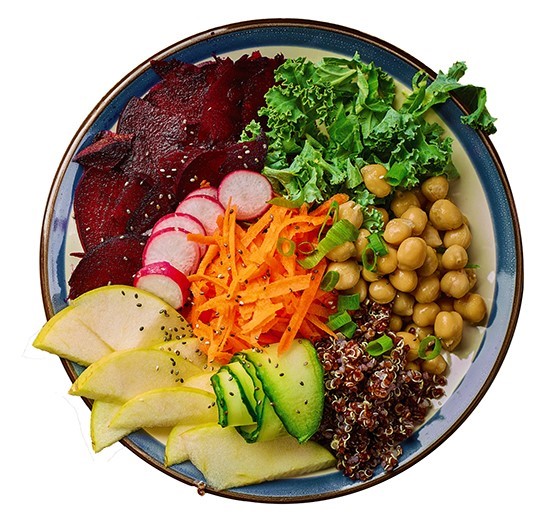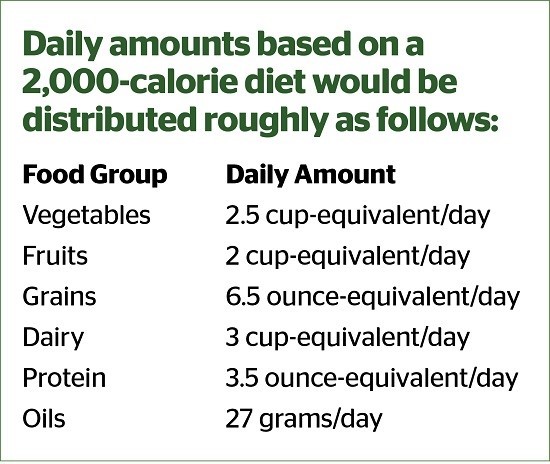Recently diets and meal fads have become increasingly popular. Regarding
diets, vegetarianism seems to be one of the most popular. It is estimated that
18 percent of the world’s population follows some form of a
vegetarian diet.
Whether due to personal health reasons or ethical reasons, there are benefits
to being vegetarian.
اضافة اعلان
However, like any
limitations on food intake, vegetarianism could pose certain risks if not done
correctly.
Types of vegetarians
Generally, the concept of vegetarianism is no meat, poultry, or fish, but
there are different forms for practice.
One common form of
vegetarianism is the lacto-vegetarian diet. In this form, meats, fish, poultry,
and eggs are excluded from the diet, but dairy products such as milk, cheese,
and butter are included.

An ovo-vegetarian diet
excludes meats, fish, poultry, and dairy products but includes eggs. A
lacto-ovo
vegetarian diet, however, excludes meats, poultry, and fish but
includes dairy products and eggs.
Lastly, a
pescatarian diet excludes meats, poultry, dairy, and eggs but includes fish.
Benefits
Aside from the ethical benefits of reducing the farming and butchering of
animals, vegetarianism may provide many health benefits. Generally speaking,
when compared to those who include meat in their diet, vegetarians tend to have
better levels of fiber, vitamin C, vitamin E, and
magnesium.
In addition to
better levels of nutrients, a vegetarian diet may also help with weight loss. A
2016 meta-analysis of vegetarians and non-vegetarians found that, on average,
vegetarians lost 2kg more weight than non-vegetarians over an 18-week period.
Similarly,
vegetarians tend to have lower levels of triglycerides, total cholesterol, and
LDL, or bad cholesterol. These defining features of vegetarianism may prove
beneficial in certain chronic diseases such as diabetes and overall heart
health. A 2014 meta-analysis found that vegetarianism was linked to better
control of
blood sugar levels in those with type 2 diabetes.
A 2012 study conducted in Jordan ... comparing chronic disease and health between vegetarians and non-vegetarians ... found that vegetarians consistently had lower rates of chronic conditions such as diabetes, hypertension (high blood pressure), and obesity.
A 2012 study
conducted in Jordan focused on accentuating the benefits of being a vegetarian
by comparing chronic disease and health between vegetarians and
non-vegetarians. They found that vegetarians consistently had lower rates of
chronic conditions such as diabetes, hypertension (high blood pressure), and
obesity.
Lastly, some evidence
suggests that a vegetarian diet could be linked to a reduced risk of developing
certain cancers such as breast, colon, rectum, and
stomach cancer.
Unfortunately, evidence is limited to observational studies and has been, at
times, inconsistent.
Concerns
Humans are omnivores, which means they can source food from plants and
meats. Being omnivorous served an important role in human survival as it
allowed us to obtain nutrients from various sources.
The more limited
your diet is, the more likely you become deficient in certain nutrients, which
can ultimately pose a health risk. In the case of vegetarians, many nutrients
are found in meats and dairy products that may be hard to substitute.
Meats, poultry,
and fish are good sources of protein and omega-3-fatty acids but also a source
of other nutrients such as zinc, selenium, iron, and
vitamin B12. Dairy
products and eggs are also good sources of calcium, vitamin D, and various
vitamin Bs.
As a result,
vegetarians are at risk for deficiencies in protein, calcium, iron, iodine, and
vitamin B12. Deficiencies in these nutrients can lead to a host of conditions
and complications such as fatigue, general weakness, anemia, bone loss, and
thyroid issues.
Additionally, to
compensate for the restricted diet, vegetarians often rely on heavily processed
foods that may be high in calories, sugars, fats, and sodium.
 Getting your
nutrients as vegetarian
Getting your
nutrients as vegetarian
To remain healthy, a vegetarian must supplement the lost nutrients in
other forms. Often, vegetarians will use supplements and multivitamins to
compensate, but there are more natural alternatives.
According to the
2015–2020 Dietary Guidelines for Americans, a proper diet for vegetarians can
be broken up into six main food groups. This includes vegetables, fruits,
grains, dairy, protein, and oils.
The more
restrictive the form of vegetarianism is, the more you will need to adjust your
recommended food group intake. These guidelines serve as a rough template and
if any foods do not coincide with your form of vegetarianism, be sure to
supplement as them appropriately.
Vegetables
Vegetables are divided into five different groups: dark greens, reds and
oranges, legumes, starchy, and others.
Dark green vegetables include broccoli,
spinach, romaine, kale, collard greens, turnip, and mustard greens, and 1.5
cup-equivalents should be consumed per week.
Orange and red
vegetables include tomatoes, red peppers, carrots, sweet potatoes, winter
squash, and pumpkin, and 5.5 cup-equivalents should be consumed per week.
Legumes include
kidney beans, white beans, black beans, lentils, chickpeas, pinto beans, split
peas, and edamame, but do not include green beans or green peas. A 3
cup-equivalents of legumes should be consumed per week.
Starchy vegetables
include white potatoes, corn, green peas, green lima beans, plantains, and
cassava, and a 5 cup-equivalent should be consumed per week. Other vegetables
include iceberg lettuce, green beans, onions, cucumbers, cabbage, celery,
zucchini, mushrooms, and green peppers, and 4 cup-equivalents should be
consumed per week.
Grains
Grains are divided into whole grains and refined grains. Whole grains
include whole-wheat bread, whole-grain cereals and crackers, oatmeal, quinoa,
popcorn, and brown rice, whereas refined grains include white breads, refined grain
cereals, and crackers,
pasta, and white rice. Around 3.5 cup-equivalents of
whole-grain foods and 3 cup-equivalents of refined grain foods should be
consumed each day.
Protein
Protein sources for vegetarians are limited. However, various nuts, seeds,
soy products, and eggs, if your diet allows for it, could be beneficial
sources. If eggs are allowed, you should consume a 3 ounce-equivalent per week.
Examples include lentils,
chickpeas, peanuts, and almonds, and 14
ounce-equivalents should be consumed per day.
Other nutrients
Vitamin B12, iron, and
zinc are important in red blood cell production,
and deficiency may result in anemia. Unfortunately, these nutrients are found
almost exclusively in animal products. However, many soy and cereal products are
fortified with vitamin B12, iron, and zinc. But it is important to monitor your
levels regularly and take supplements if needed.
Omega-3 fatty
acids are another important nutrient that plays a role in heart health.
Omega-3s are commonly found in fish and eggs, but a few plant-based options are
available. Canola oil, soy oil, walnuts, and soybeans are good sources of
essential fatty acids.
Read more Health
Jordan News



